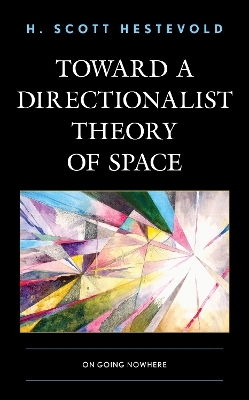
Toward a Directionalist Theory of Space
On Going Nowhere
Seiten
2022
Lexington Books (Verlag)
978-1-4985-7998-8 (ISBN)
Lexington Books (Verlag)
978-1-4985-7998-8 (ISBN)
Arguing that the universe is absolutely directioned and that there exist spatial (directional) relations that Leibniz overlooked, H. Scott Hestevold formulates a new relationalist theory of space, exploring its implications for the Special Composition Question, reductivism regarding boundaries and holes, and the nature of spacetime.
In Toward a Directionalist Theory of Space: On Going Nowhere, H. Scott Hestevold formulates a new relationalist theory of space by appealing to the view that the universe is directioned in the sense that there exist directional relations—a class of spatial relations that Leibniz overlooked. Extending the directionalist/relationalist theory of space to the problem of when it is that discrete objects compose a whole, Hestevold revisits his answer to the Special Composition Question. He also uses the directionalist/relationalist theory to formulate reductivist theories of boundaries and holes—theories that may allow one to resist the view that boundaries and holes are ontologically parasitic entities. Finally, he explores directionalism/relationalism vis-à-vis spacetime. After noting findings of modern physics that favor substantivalist spacetime and then developing metaphysical concerns that favor instead directionalist/relationalist spacetime, Hestevold notes the ontological benefit of endorsing spatiotemporal directional relations even if spacetime substantivalism is the winning theory.
In Toward a Directionalist Theory of Space: On Going Nowhere, H. Scott Hestevold formulates a new relationalist theory of space by appealing to the view that the universe is directioned in the sense that there exist directional relations—a class of spatial relations that Leibniz overlooked. Extending the directionalist/relationalist theory of space to the problem of when it is that discrete objects compose a whole, Hestevold revisits his answer to the Special Composition Question. He also uses the directionalist/relationalist theory to formulate reductivist theories of boundaries and holes—theories that may allow one to resist the view that boundaries and holes are ontologically parasitic entities. Finally, he explores directionalism/relationalism vis-à-vis spacetime. After noting findings of modern physics that favor substantivalist spacetime and then developing metaphysical concerns that favor instead directionalist/relationalist spacetime, Hestevold notes the ontological benefit of endorsing spatiotemporal directional relations even if spacetime substantivalism is the winning theory.
H. Scott Hestevold is professor emeritus of philosophy at The University of Alabama.
PrefaceChapter 1: The Map to Nowhere and Beyond
Chapter 2: Spatial Directionalism
Chapter 3: A Directionalist Theory of Space
Chapter 4: Defending Spacelessness
Chapter 5: The Special Composition Question Revisited
Chapter 6: Is the Road to Nowhere Without Boundaries and Holes?
Chapter 7: Is Modern Physics a Roadblock to Going Nowhere?
Bibliography
| Erscheinungsdatum | 05.05.2022 |
|---|---|
| Reihe/Serie | Toposophia: Thinking Place/Making Space |
| Verlagsort | Lanham, MD |
| Sprache | englisch |
| Maße | 155 x 218 mm |
| Gewicht | 304 g |
| Themenwelt | Geisteswissenschaften ► Philosophie ► Metaphysik / Ontologie |
| ISBN-10 | 1-4985-7998-1 / 1498579981 |
| ISBN-13 | 978-1-4985-7998-8 / 9781498579988 |
| Zustand | Neuware |
| Haben Sie eine Frage zum Produkt? |
Mehr entdecken
aus dem Bereich
aus dem Bereich
Buch | Hardcover (2024)
Matthes & Seitz (Verlag)
CHF 41,90
Über konstruktivistisches Denken in der Theologie
Buch | Softcover (2024)
Verlag Herder
CHF 79,95


